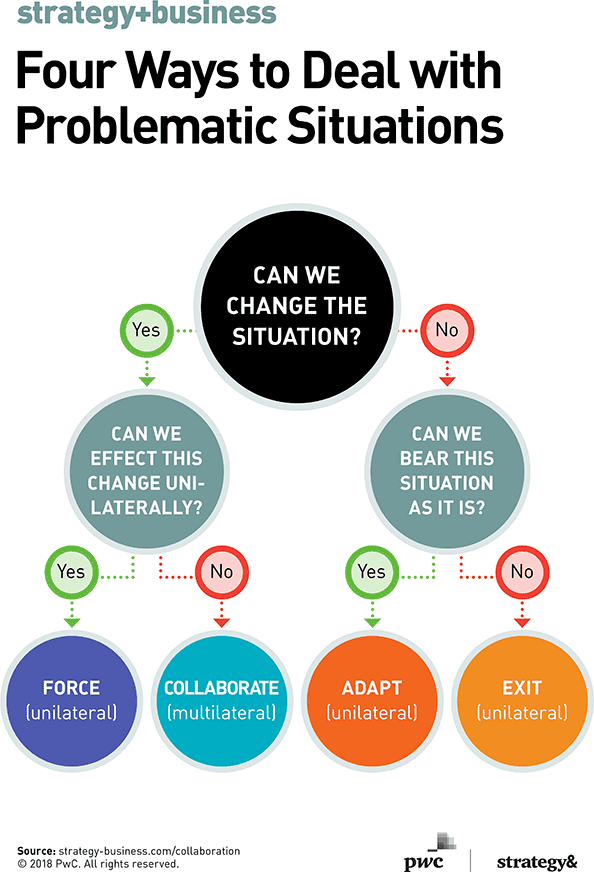Collaborating Isn’t the Only Option
Working with diverse others doesn’t have to mean compromising your values. But if you just can’t do it, there are other ways to solve difficult problems. See also “Four Ways to Deal with Problematic Situations.”
Last November, on a cold evening in Vancouver, Canada, I gave a public lecture on my most recent book, Collaborating with the Enemy. At the end of the question-and-answer period, a young man in a long coat stood up and asked me, his voice shaking with agitation, “How can you advise us to collaborate with people who abuse human rights and cause climate change? That would be treason!”
I knew this was an important question, and I wanted to answer well, but I didn’t manage to, and so this exchange lingered in my mind. Many people have objected to the title of my book, especially because the phrase “collaborating with the enemy” evokes the heinous treachery of the people who cooperated with Nazis during World War II. When I was writing the book, every time I posted a draft chapter on social media, one of my cousins replied that surely I wasn’t in favor of engaging with ISIS. To some people, collaborating is illegitimate because it implies consorting with the devil.
I ended up sticking with the title Collaborating with the Enemy because it summarizes a tension I see as inherent and central to working with diverse others — not one that is incidental or that occurs only in extreme cases. This tension is revealed in the two dictionary definitions of the word collaborate: “to work jointly with” and “to betray.” We often find that to make progress on our most important and difficult challenges, we need to work with people whose perspectives and positions are different from ours. At the same time, we worry that to work with these people may require us to betray what matters most to us.
Here is what I wish I’d said to the young man in Vancouver. If you think you can get where you are trying to go by working only with people you agree with — and not with those whom you consider beyond the pale — then I encourage you to go ahead. I’m not trying to hold you back from energetic action. I’m not telling you that you must compromise or that collaborating is your only option for trying to change situations that you think are unsatisfactory, unsustainable, or unfair.
In fact, you have three other options. You can try to force the situation to be the way you think it should be, ignoring, circumventing, or defeating those who think differently. For example, a boss can successfully force an unpopular new company policy if her subordinates comply, even though they object. You can try to adapt to the situation as it is — to go along to get along, as do the subordinates who don’t like the policy but figure they can’t change it and think it’s not worth quitting over. Or you can try to exit or escape from the situation. For example, some of the subordinates might go work for another company whose policies they like better.
Often one or several of these approaches can work. For most people, collaborating is what they choose to do only once they’ve concluded, regretfully, that forcing, adapting, or exiting will not get them where they want to be.
Working with diverse others doesn’t have to mean compromising your values. But if you just can’t do it, there are other ways to solve difficult problems.
If you do choose to try to collaborate, though, don’t assume that compromise and betrayal are inevitable outcomes. Collaboration doesn’t mean that either you prevail and get what you want, or your opponent does, or both of you sacrifice and meet somewhere in the middle. The higher potential of collaboration with diverse others is that together you’ll be able to understand more of your situation and so will be able to create new options that are better than the ones you’d been able to imagine or implement separately — better than forcing, adapting, or exiting. A character in Rent, Jonathan Larson’s Broadway musical about struggling artists in New York City, says, “The opposite of war isn’t peace, it’s creation!”
I’ve spent the past 27 years helping the most diverse teams work together on their most vital and difficult challenges. Sometimes they succeed and sometimes they don’t; sometimes they work together for decades and sometimes only for days. Often their collaborating is unstable and they also employ forcing, adapting, and exiting. But their efforts together always produce new ideas, relationships, and possibilities, and these are always valuable.






